Quote
An antitrans stance is an antifeminist stance; it is against the feminist project of creating worlds to support those for whom gender fatalism (boys will be boys, girls will be girls) is fatal.
Sara Ahmed, Living a Feminist Life (234)
558 notes
·
View notes
Quote
When I get confused about love, or other things in the world, thinking about Spinozian definitions often helps me because of their clarity. Spinoza defines love as the increase of our joy, that is, the increase of our power to act and think, with the recognition of an external cause. You can see why Spinoza says self-love is a nonsense term, since it involves no external cause. Love is thus necessarily collective and expansive in the sense that it increases our power and hence our joy. Here’s one way of thinking about the transformative character of love: we always lose ourselves in love, but we lose ourselves in love in the way that has a duration, and is not simply rupture. To use a limited metaphor, if you think about love as muscles, they require a kind of training and increase with use. Love as a social muscle has to involve a kind of askesis, a kind of training in order to increase its power, but this has to be done in cooperation with many.
Michael Hardt, “No One is Sovereign in Love: A Conversation Between Lauren Berlant and Michael Hardt – Heather Davis & Paige Sarlin”
(via repetition-is-holy)
2K notes
·
View notes
Quote
Another way to encapsulate this is that queer theory sees sexuality as a process rather than a foreclosing identity. This meant that one constantly has to be attending to the action and development of one’s patterns of attachment. What is this object of desire standing for? A straight woman, for example, doesn’t want all men, just some: so why not rethink sexuality as the history of a patterning or style that develops over time, in relation to law, norms, and the accidents and incidents of ordinary life?
Lauren Berlant on Cruel Optimism for Rorotoko, 5 June 2012 (via derica)
504 notes
·
View notes
Text
I’m having one of those moments when it feels as if I’m stuck between endless variables of daily life and not a single one seems to be unraveling. I don’t want to read, I don’t want to call someone for coffee, I don’t feel like cleaning or cooking (nor should I, actually), I did all of my chores for the day and yes, there is some business I should get to eventually but nothing so urgent that would push me to actually do it immediately. I hate this.
So I decided to make myself some coffee and sit by the window while drinking it, as if I’m a desperate, scarred female character that’s been tortured by hardships of living as much as she was by that very same exhausting drama trope. I might be that character, of course, but why settle? Anyway, looking through the window I’ve recognized the familiar colors and moods of Autumn. Yes, it set on the wheel of overthinking it. But as I am alone, and I do have an apartment for myself with nothing better to do, I am going to indulge.
For me, there’s a very specific feel to Autumn that I remember from my childhood, as well as from more recent years. For me as a child, this meant an end of the summer and beginning of school but it never meant great sadness. Of course, I’d be sad for a couple of days but I actually looked forward to school, in those moments when I would manage to keep anxieties off. As a teenager, I was relieved that summer was over, it meant going back to a routine, going back to fostering friendships by circumstances (school) not by popularity (I wasn’t good at that). As a college student and by each ear, this meant dealing with great anxiety as September was always a time of final exams and would simply shift into Autumn with me being left dazed and confused by the beginning of the new academic year. Sometimes these anxieties were too much for me but sometimes, I would be truly excited and happy to begin with a new semester. What all these points of seasonal reflexivity have in common is some sort of healthy way of dealing with past and looking into future, even if it meant cringing and stomach ache on the first couple of days of school/lectures. This year, well, it’s very different.
I am still looking into future but I see too much of it already planned and it makes me so scared. I’m not dealing with past either. I could say that writing this might be some way of dealing but struggling to name things in order to justify my mistakes and missed changes got me to this very moment so I’ll leave this post in between, just as is my mood and flow of thought today. And being “in between” means so much regret. Could I have started going back to meds sooner? Could I have prevented this and actually pass my exams? Could I have kept myself in academic shape without completely losing touch with everything and feeling so incompetent now? Could I have now been in the same position as everyone else around me, performing the normalcy I’ve had always desired? Am I going to actually learn anything from this experience and how it will affect those around me? And what to do next? This sure wasn’t my plan. It wasn’t my plan to deal with patching holes and cleaning leftovers that I’ve left behind while being sick. And this is what I’ll be doing for the following months, maybe even a year. How can I “get better” when at this point in between seasons I can’t even be anxious by not knowing what to expect when everything has already been laid out for me - my sentence is now beginning and I must pay my dues. So yes, I feel tremendous regret, partly on the behalf of my mistakes that I’ve done more or less consciously, partly on the behalf of life contingency that brought me up to this point. Both of them can’t be resolved, regretting right now feels as being permanently stuck in between.
Yes, I could rationalize everything by creating another of my own relativism - there’s no inherent meaning to beginning to Autumn, I am romanticizing this entire event to justify being this obnoxiously self-centered. It’s true, there’s nothing inherent to Autumn, from it’s name, period to it’s colors, we ascribe it, we organize it and we live by it. But I guess there is at least one lesson behind all this madness and that is that relativism of intimate events and feelings can be very dangerous and painful. That’s what I’ve been doing to myself these past months. So I won’t do it and I will remain in the senses of my own perception, of my own meanings (they’re never my own but sometimes you have to fool yourself). And in that space, I’m so painfully stuck. I can’t make sense of what happened, I can’t let myself go and take day by day and I have very little room to plan the future. I only have regret and fear that I will never escape this space. And how could I not be afraid of my capacity to escape it when it only took a lonely moment of staring through the damn window to realize such fear exists? I am so scared.
0 notes
Text
When I started with my Literary Translation course this semester I was in awe and loving it so much. And now, when it’s reaching its end, I sort of dread it. It’s really difficult, I do not have that wit to simply go from one language to another while also making great sense and keeping all the layers of textuality from the source text. This inability really comes to light right now when I’m translating August: Osage County. Love the play, love the movie, hate myself.
0 notes
Photo
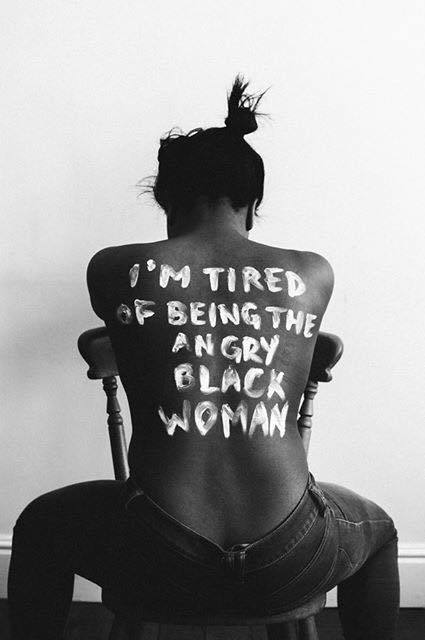
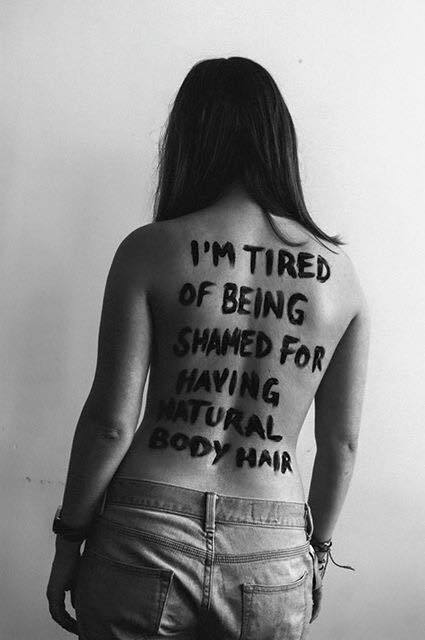

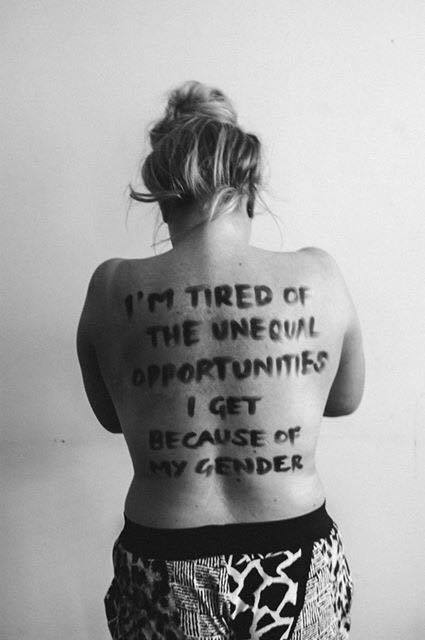
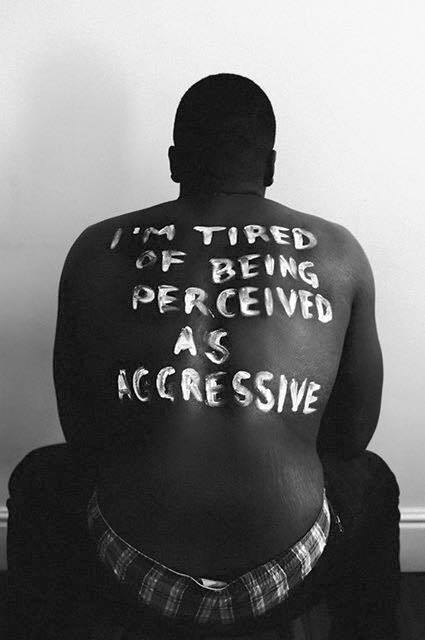
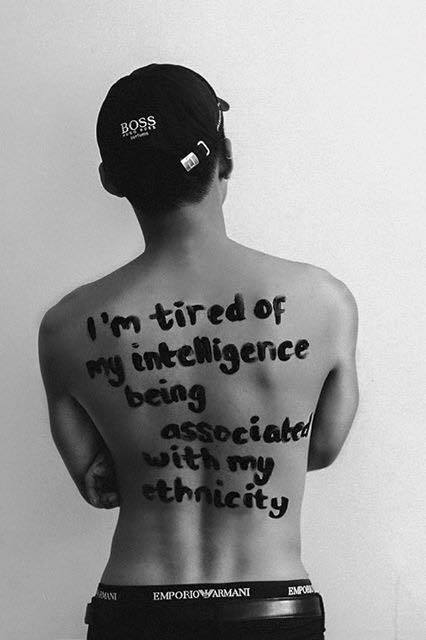
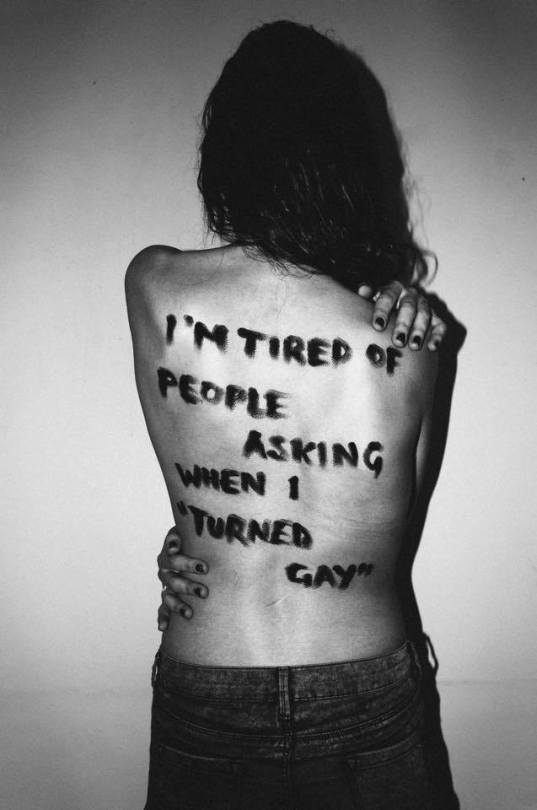
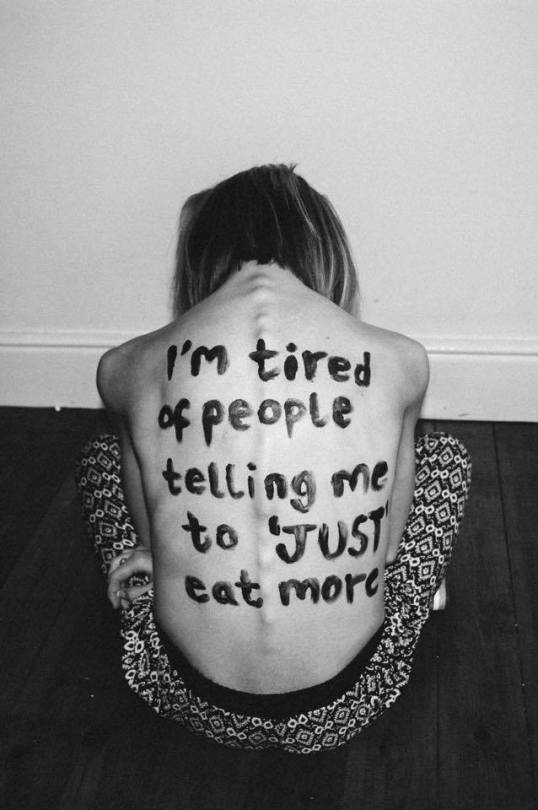
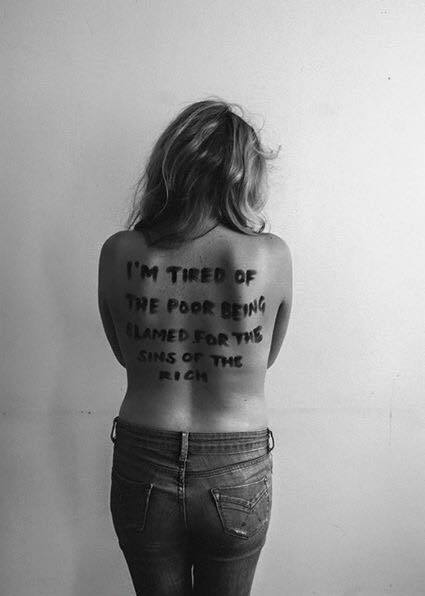
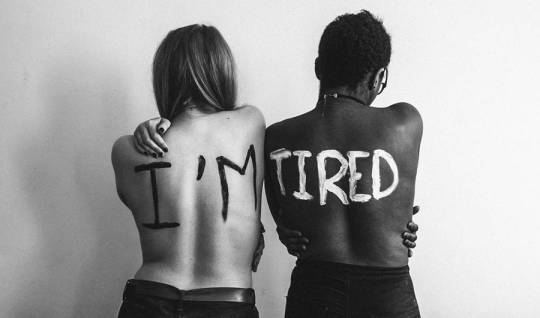
These stunning photos capture just how exhausting micro aggressions can be
Paula Akpan and Harriet Evans have launched the “I’m Tired” project to highlight the impact common microaggressions and stereotypes many face on a daily basis. By symbolically and literally carrying the aggressions on their backs, Apkan and Evans hope to help both the subjects and everyone else.
299K notes
·
View notes
Photo
LOL. But are we sure they’d have their face pics and not their torsos?

“It wasn’t easy being gay a long time ago in a galaxy far, far away.”
105 notes
·
View notes
Photo

Duane Michals, Things are Queer (1972)
1 note
·
View note
Text
Straight men who have sex with other man
Once I’ve managed to move on from initial outrage I’ve felt upon learning about his “new phenomenon” (How do you mean ‘you’re not gay”?!) I started to fold my thoughts on this. All that I’m writing in the next paragraph has been written over and over again so skip to the third one if you’re already familiar with the topic.
Obviously, “straight men who have sex with other man” is hardly any new phenomenon. Whenever some new “brand of sexuality” appears it’s good to remember that historical cultural traditions throughout the world (pre-modern) did not construct sexualities as we do today - sexual identity is a modern construct. Therefore, from practical point of view, men have had sex with each other for as long as they exist. It’s only later we added categorizations to sexualities. This is not to say that cultural hierarchies that we’d recognize today as heteronormative did not exist - they did, just as other norms of “turning the blind eye” existed or even those that found pretty clear societal and cultural function for homosexuality (a good beginning source for this is bascially any book dealing with history of sexuality - I personally learned this from Gay Life and Culture: A World History ed. by Robert Aldrich as it also deals with gay history in Asia and Africa).
It’s easy to understand why is this idea so confusing - if homosexuality implies sex between two men or women, how is it that men who are doing precisely that refuse to identify (at least for pragmatical reasons of language) as homosexual? Obviously, queerness (let’s leave “homosexual” once for all to die in peace along with other pathologies) is not desired. We’re talking about US social context in here; a country that seemingly enjoys the afterlife of queer movements which are now being transformed and integrated into technocratic state; a country which managed to re-appropriate queerness to the extent of writing it into law as nationally approved through maintaining the ideological belief and practice of the American family and avoiding any conflict with civil organizations whose work is LGBTQ oriented. In fact, the possibility of conflict or criticism from any “grassroots” organization seems quite impossible when we know that “queer” is no longer a desired political identity as it is perhaps “too radical” to argue for when depending on public funding. Instead, it seems that queer politics of identity has been replaced by humanitarization - queer people are now institutionally marked as another “vulnerable” group that seeks humanitarian attention within youth and/or “economically deprived people”.
But this is a critical viewpoint (although not that elaborate as it should be and I apologize for that), it can’t be that this is how political identity of queer people and organizations looks like to majority of men exploring their sexuality? It’s much easier to contextualize these men in my own social and cultural context of Middle to Eastern Europe (Croatia specifically) in which, it's safe to say, queerness is still constructed in ways it had been constructed in US during 1980s (I compare these two now just to make an argument but they really couldn't be compared this easily). But what about US context? How is the work of the LGBT organizations represented and how do these men percieve them? Is the refusal of political aligning by sexuality the result of cultural representations of queerness or is it the result of the poor work on behalf of such organizations? I think it’s both - cultural representations remain as the space of oppression for queer people while their institutional conuterpart is not radical enough, they cannot promise solidarity in identity as they alligned with hegemonic practice of the state, learning to normalize identity differences through self-governing. Winning of “love” which has been articulated through “same-sex” marriage does not mean much for any men out there whose sexuality cannot correspond to normalized and desexualized identity of gay love.
0 notes
Text
Happiness, it’s hard
Happiness, what’s up with that? As fabricated as it can be, I still want to have a consistency of whichever feeling or bundle of it we learned to call happiness. I’m not talking about joy - presuming this is that instant feeling of happiness in certain moments. That I do get, no as often as I wish probably but mapping out a personal deprivation of such little moments recquires a pretty good and consistent memory of one’s own actions and feelings which I certainly don’t possess. What I am talking about is BEING happy, feeling a good deal of joy and self-satisfaction over a longer strech of time. I don’t know what stretch that would be but I guess it should be long enough to answer spontaneously and honestly to another person’s question of your state:
Are you happy? - Yes, of course.
I cannot imagine answering this question positively without at least some personal assessment. So I usually go with “Well, I’ don’t know, I guess...” or “Not at the moment, actually” (if I’m feeling up to bringing another person down with me) or even “I can’t answer that. Don’t you think that is kind of a stupid question’” (when I’m feeling what they call “defensive”). So, yes, I believe that satisfactory stretch of time of being happy is achieved when one answers this question immediately.
Now, is that entirely utopic kind of thinking? Am I completely deluded by believing in this or am I simply reproducing so many different ideologies about always being a pure ray of sunshine that is fed to us? I’ve always been said that even if someone seems very happy and content I should think twice before I start to compare myself to them because they might seem well at the moment but everybody has some kind of burden they’re carrying around that eventually comes up on the surface for everyone to see. Of course, this is a simple idea of universal balance - everything evens out eventually. Obviously, it’s a very dogmatic way of thinking because its logic is based on belief in the source of authority that is entirely metaphysical in exsistence. So I don’t endorse it. But the idea of authority of happiness is interesting. What really unsettles me is the feeling I get when I try to imagine some people being unhappy. This triggers anxiety because I can rarely imagine them being unhappy. And here, “being unhappy” category is purely defined out of my own subjectivity - I imagine them feeling as bad as I feel. And that’s the problem of authority. I will never really be able to imagine someone being unhappy as I am if I’m only assessing their (un)happiness acording to my own experience and feeling. That’s unreliable and produces a very distorted image of one’s self. Another way to compare yourself to others is to measure happines according to whichever norms and values you consider important at the moment. Doing well in studies or profession, sorting out your personal life (family relationships etc.) or even physical looks. This becomes another source of frustration once you realize (and this to be realized over and over again) majority of these are purely ideological. Again, you’re met with unrealiable source of authority regarding your own happines. So then what? How should I measure up myself to in regard to “levels” of happiness when there are no reliable norms stating them? You can say I should simply rely on my own feelings - simply put, if you feel happy, then you’re happy. Obviously, but what about BEING happy. When do I start to be happy? I cannot rely on myself for this answer because I don’t trust myself. I cannot measure my levels of sanity and compare them to others’ feelings of sanity or established norms of it because I end up in the same loop as I do with measuring happiness. There’s never going to be proper corespondence between these two. So I don’t know what being happy means, but to me, this is what being unhappy means. It is a knowledge that you’re imprisoned by insecurity and disbelief in whichever path of being and doing is projected on you as normative and natural. But as optimistic as I feel at the moment, I’ll say this - what if it’s possible to rearrange happiness out of this seemingly fatal situation for myself only? What if this understanding of insecurity can produce security? I would like to go with that.
0 notes
Quote
Those commentators that seek to distinguish among sorts of muslim communities and political views are considered to be guilty of pursuing “nuances.” Apparently,the enemy has to be comprehensive and singular to be vanquished, and the difference between muslim and jihadist and ISIL becomes more difficult to discern in public discourse. The pundits were sure who the enemy was before ISIL took responsiblity for the attacks.
Judith Butler - Mourning Becomes The Law (via queeranarchism)
7 notes
·
View notes
Text
The “bad reading” of Gender Trouble
There are several misconcpetions with Judith Butler’s writings existing in public and intellectual discourse but this one particularly helped to form a public knowledge of gender as of something simplistic as a lifestyle:
"The bad reading [of Gender Trouble] goes something like this: I can get up in the morning, look in my closet, and decide which gender I want to be today. I can take out a piece of clothing and change my gender: stylize it, and then that evening I can change it again and be something radically other, so that what you get is something like the commodification of gender, and the understanding of taking on a gender as a kind of consumerism … When my whole point was that the very formation of subjects, the very formation of persons, presupposes gender in a certain way—that gender is not to be chosen and that “performativity” is not radical choice and it’s not voluntarism … Performativity has to do with repetition, very often with the repetition of oppressive and painful gender norms to force them to resignify. This is not freedom, but a question of how to work the trap that one is inevitably in. " Judith Butler
Recently, I have been told that while Gender Trouble is THE work on gender that it has also, somehow, lost its appeal it once had. Initially, I was surprised but then I started thinking as to why this may be so. I do feel that this opinion is shared by many young students and academics out there. And I think it is exactly this misconception of gender “as a radial choice” that is becoming a prevalent piece of Butler’s writing everybody is referring to without realizing the full complexity of her argument. Without it, Butler’s view on gender really does seem simplistic and of course anyone will ask themselves after some time “Ok, so you perform it. But what else is there?” Apart from every of the million+ conservative organizations that took this argument as a standing point in their cause of defending a “God-given sex”, sociology should also take some blame for spreading “the bad reading” of Gender Trouble. It has somehow become a smart idea to link gender performativity with lifestyle and consumerism. Not entirely crazy, at least as just an idea. But then, sociological claim regarding this usually goes in the lines of “lifestyle plurality” where “actors” choose between numerous options of presenting themselves which also includes presenting a gender. While that may be so, it is ridiculous to claim that gender performing through lifestyle is somehow voluntary. Only criticism to this claim, at least to my knowledge, has been made on part of some (neo)marxist works stressing that the freedom of lifestyle choosing is simply illusionary as it happens through the logics of capitalism and consumerism. This is correct and still very much applicable but “lifestyle of gender” is entirely tautological. If a subject (in sociology’s case, an actor) has a free will to choose of visual gender performance through lifestyle (usually meant style of clothing of course), and by that I mean that each and every one would sort male/female styles of performing simply by perpetuation of visual signifying of gender, wouldn’t that simply deny that gender normativity exists? In other words, if one can “pick” gender through “lifestyle” how is specific lifestyle recognized as male or female or transgender if there’s no existing normativity on gender distinction? So this quoted disclaimer (I’d like to call it that) should just be posted to every syllabus of every university course dealing with gender and Butler’s work. But then again, I have been informed students don’t read those.
1 note
·
View note
Text
What the hell is affect theory?
I have been reading Marita Sturken’s essay on Lauren Berlant’s “Queen Goes to Washington” and came across the “affect theory”. Berlant never explicitly situates her in the field (as far as I know) which is no surprise considering her point on academic disciplines being limiting in many ways (check out this text on the afterlives of queer theory for more). The introductory chapter from Gregg’s and Seigworth’s reader on affect theory is available online and serves as a great introduction to a more extensive reading.

0 notes
Text
Reblogging this 2 years after just to note that the professor who held this class really had a very limited knowledge on phenomenology (she sucked ass). Something I have realized just recently.
ME LISTENING A COURSE ON QUALITATIVE RESEARCH

1 note
·
View note
Quote
There’s really no such thing as the ‘voiceless.’ There are only the deliberately silenced, or the preferably unheard
Arundhati Roy (via counterstorytelling)
8K notes
·
View notes




